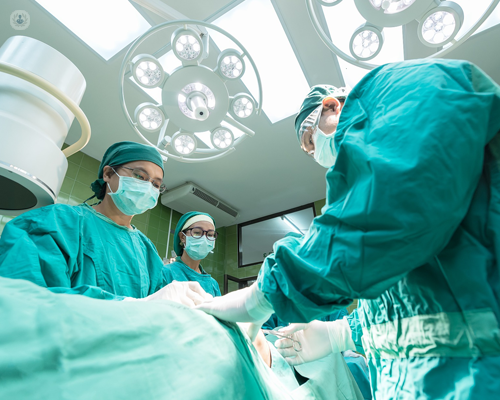All about gallbladder surgery
Written in association with:If you have gallstones and are concerned that you may need surgery, it’s more than likely you have questions about it.
Here to shed light on what is involved in the gallstone surgery process and whether or not surgery is actually required, is revered consultant surgeon Mr Shashi Irukulla.

What can cause gallbladder problems? What are the symptoms?
The causes of gallbladder problems are usually unknown but can be due to imbalance between cholesterol and bilirubin content of the bile. However sometimes a patient is prone to developing gallstones with rapid weight loss and following traditional operations like, truncal vagotomy which used to take place many years ago for ulcer treatment.
You might have heard of a famous four or five Fs:
- Fat;
- Forty;
- Fertile;
- Female;
- Fair.
These were typically associated with gallstone patients. Having said that in my practice, I've seen patients developing gallstones regardless of their age, gender and race. The youngest patient I've been involved in gallbladder stone management was 11-years old. The oldest I've operated on is 94. I've heard patients with gallstones at the age of 100.
When is gallbladder surgery necessary? Are there other treatments available?
Gallbladder surgery is required when the patient has symptoms from gallstones and the symptoms can vary between recurrent, mild pain, which usually starts under the ribcage on the right side, lasting for half an hour to three hours. The pain can radiate to the back, and it can be associated with feeling nauseous or vomiting, and it can range between mild pain to serious complications; sometimes gallstones can migrate into the main bile tube, cause both pancreatitis, and block bile flow from the liver leading to jaundice.
Anyone with symptoms or complications require operation. It also depends on the patient's suitability to have general anaesthesia and whether they're able to tolerate the operation.
By in large, most patients are suitable for operation. An exceedingly small proportion of patients may not be suitable for operation. In that case, we have different forms of treatment.
If the patient is asymptomatic, which means they have been diagnosed with gallstones while having scans for various other problems. With those patients, there is not a clear indication that they should have an operation, and they need to be counselled regarding the operation and non-surgical management.
Does everyone with gallstones need gallbladder surgery?
Not everyone with gallstones requires an operation. For example, I was on call for a general surgery in our NHS hospital this weekend. I had a patient with gallstones at the age of 94. I had a conversation with the patient, and they didn't want to have any operation, so I treated her with antibiotics, and she seems to have responded to the treatment. Should she deteriorate, I may ask our X-ray radiologist to put a drain into the gallbladder to relieve any pressure from the gallstones. This procedure is called percutaneous cholecystostomy, which is not ideal but when you look at the risk and benefits, the benefits of conservative treatment outweigh the risks of surgery.
Is gallbladder surgery a painful operation? How long does recovery take?
Nowadays gallbladder surgery is done laparoscopically, which is a keyhole technique. The pain is milder, compared to when we did open operations twenty years ago, so most of these patients can have surgery, as planned, as a day case. This means they have the operation in the day and go home on the same day. They will be mobile immediately after the operation, and once they recover from anaesthesia, they will be able to go home and recover in their familiar environment. It can be painful, and we recommend the patient to take regular painkillers and anti-nausea medication. Sometimes the painkillers can cause the patient to become constipated which can be resolved with simple laxatives.
The total recovery of a patient depends on the patient's attitude. I have seen some patients going back to work within two days of having a gallbladder operation, to taking three or four weeks of time off. It's dependent on multiple factors but I would definitely not recommend any patients going back to driving soon after the operation. My mantra with the patient, is: 'Listen to your body. Do not be a hero.'
Are there possible complications of gallbladder surgery?
Yes, the complications that I explain to my patients are general. Any operation is associated with risk, such as:
- Infection of the wounds;
- Internal infection;
- Bleeding from the wounds;
- Internal bleeding;
- Deep vein thrombosis (DVT);
- Lung clots (pulmonary embolism).
These are general complications to any operation, and then general complications to laparoscopic surgeries; while you are doing the operation, you are using instruments to handle the tissue. That means you do not have a tactile sensation so there is a risk of damaging structures like the small bowel or the liver, or any other structures.
When we do gallbladder operations there is a small risk of not being able to do laparoscopic surgery. In that case, we do open operations. Although exceedingly rare it is important to discuss possibility of damaging the main bile tube, which can happen in 1: 250 to 1:500 cases.
All the complications and description of the complications should be part of the fully informed decision-making process.
If you’re in Chertsey, Woking, Farnham, Crawley, Reigate or Windsor, and would like to arrange an appointment with Mr Irukulla, visit his Top Doctors profile.


